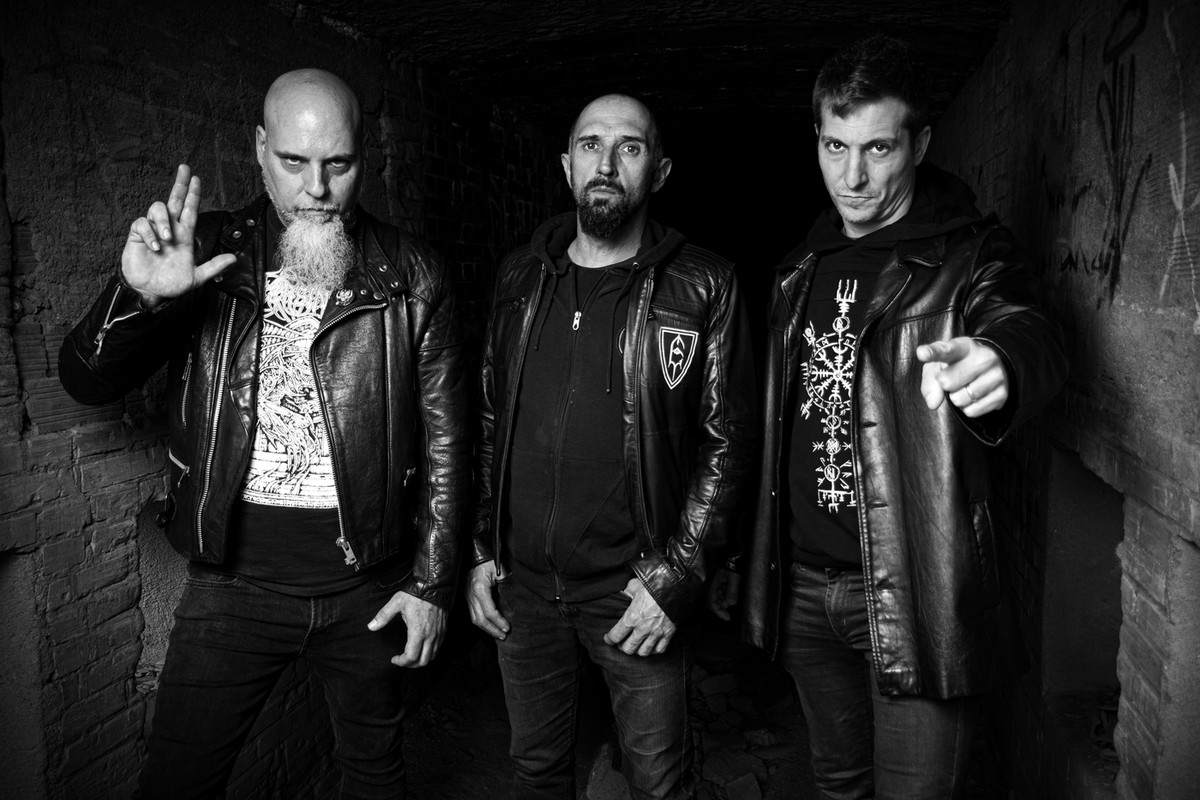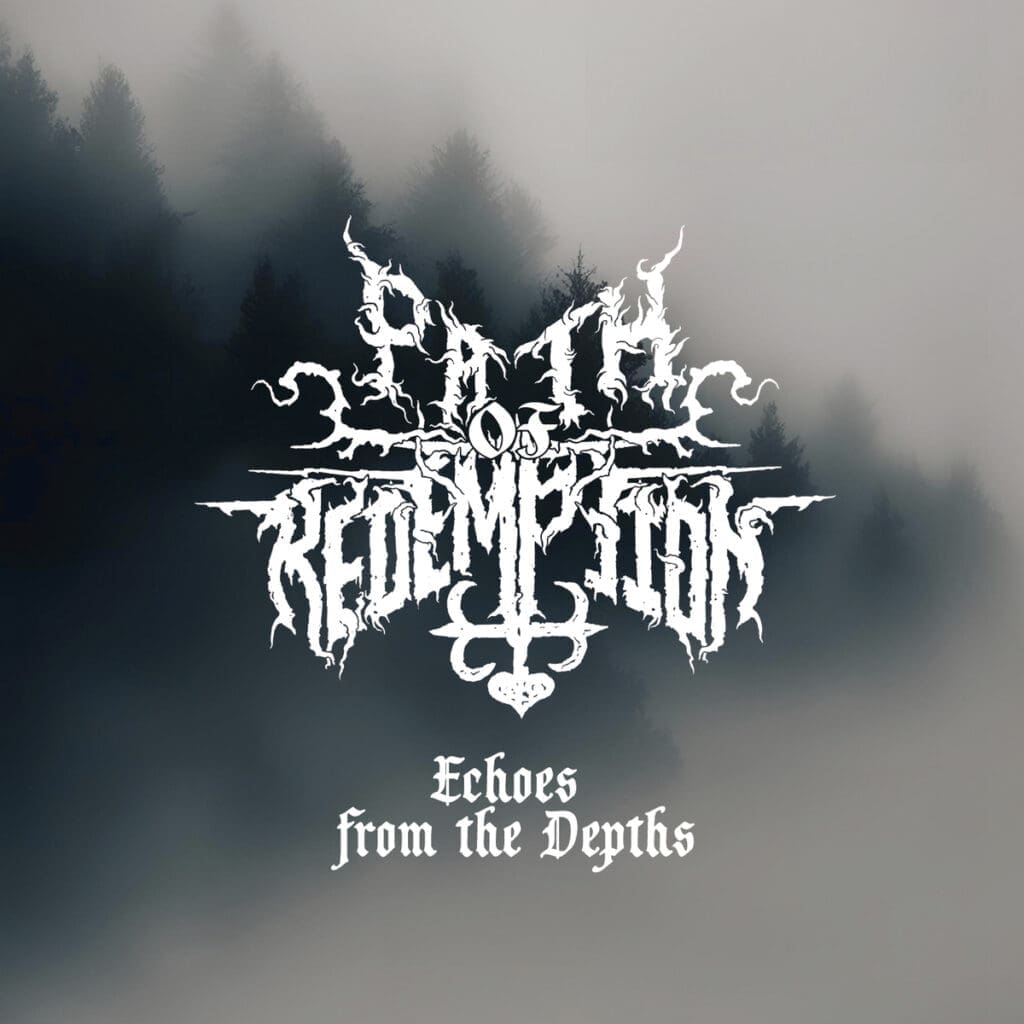Path Of Redemption — Echoes from the Depths Review
Path Of Redemption emerges from the cryptic legacy of Spanish Black Metal, summoned into being by MAP and Shogoth—both renowned for their work in the legendary cult act Ouija—alongside Fosc. In this unholy trinity, they forge not nostalgia, but a new gateway to darkness. “Echoes from the Depth,” their debut EP, will be released on July 4, 2025, through Northern Shadow.
The First Three Sins, The Summary
The Fourth Sin, Overall Discussion
Ceremonial Awakening
Path of Redemption is not just another metal album. It is the real deal—a project born from a deep underground legacy of Ouija. Think of it as a ceremonial rebirth, a moment when old shadows are brought into the light with raw, burning intensity. The band, consisting of MAP, Shogoth (both from Ouija), and Fosc, stir a potent mix of influences, with names like Dissection, Necrophobic, Naglfar, Dark Funeral, and Watain. Yet, they don’t simply imitate these giants.
Instead, they walk a fine line, blending homage with transformation. They invoke these legendary flames, adding their own dark twist. It is as if they are calling upon spectral echoes, reusing ancient spells carved into obsidian, but in ways that shake off the dust and carve something new into the night.
Path of Redemption‘s Echoes from the Depths doesn’t just recreate a past. It drags it through ruin, twisting it beyond recognition into something unholy but vital. It’s a reflection of the old, reborn in fire and shadow, refusing to be confined by tradition. Every riff, every beat feels like a ritual—both reverent and destructive. Echoes from the Depths is no nostalgic nod; it’s a rejection of the safety net, a bold push forward into the abyss.
Invocation of Chaos
The moment you hit play, you’re met with the opening track, Profane Darkness. It begins with a brief, haunting symphonic intro—almost like a prayer whispered in the dark—and then instantly, chaos erupts. The music explodes with savage force. Guitars rampage, drums hit like thunder, and the atmosphere thickens with foreboding.
Ritual Through Ruin
As the chaos unfolds into the second track, Path of Redemption, and the two remaining pieces, the album reveals itself as a dense, relentless force. In the span of eighteen minutes, four tracks establish a musical portal that is chaotic, dark, and heavy. From the opening chords, Path of Redemption emerges not just as music, but as a portal—an entryway into shadowed realms where madness and salvation collide. It’s a sonic journey into chaos—and into the idea that in despair, there might be a kind of redemption.
Path of Redemption‘s music digs deep, and the compositions refuse to let go; every note feels like a conduit for a primal truth — raw, visceral, and unpolished, but intentional. It’s music that demands surrender, offering salvation only through chaos.
Soundscapes of Wrath and Clarity
Echoes from the Depths offers a listening experience that’s as powerful as the music itself. The production is clear but fierce—no lo-fi nostalgia here. It isn’t sterilised, either; the aggression remains raw but controlled. The way the album is recorded makes every note hit hard. Each guitar string and drum strike feels like a deliberate act of ritual. The mix allows the chaos to breathe while every instrument retains its voice. There’s a spectral lay, a faint haze that shrouds the sound, giving it a ghostly allure.
It’s as if each tone was forged for a purpose—never just filling space but adding depth to the ritual. The careful balance creates a vivid soundscape where blood, beats, and atmosphere collide in perfect harmony. Furthermore, the quality of the recording and production elevates the album beyond mere chaos.
Sigil-Borne Precision: Strings, Tongue, and the Foundation
Path of Redemption’s devilmanship is tight and sharp. It’s clear the band members have years of experience under their belts. That experience shows in the precision of their playing. MAP’s guitar cut through the spectral fog with razor-sharp guitar riffs that intentionally carve into the listener’s mind. They alternate between glacial tremolo riffs and dark, funereal melodies, recalling Dissection‘s melodic darkness. Sudden shifts restrict from melodic foray to indignant dissonance, illuminating like lightning upon a storm-scarred horizon. Solo work, if it is done at all, will likely be brief — such as incantatory sigils burnt onto paper — never futile.
MAP’s vocals transcend mere sound; they are an embodiment of emotion: fierce yet harsh, biting without becoming tedious. He channels anguish, fury, despair, wrath, and enlightenment without resorting to excessive theatrics. The way he delivers is almost ritualistic, resembling an incantation rather than a performance—he doesn’t scream; he invokes.
Shogoth brings a seasoned low-end sensibility to the mix. His bass doesn’t simply follow the guitars, but fills in the space, rumbling beneath the chaos. It provides a grounding force that lends the music a sense of weight and purpose. Occasionally, the bass hints at hidden melodies buried within the storm, adding layers of dread and mystery.
Dense atmospheres, and an overwhelming rhythmic backbone, reinforce the storminess—like tectonic plates shifting beneath the surface of a dark ocean.

Pulse of the Abyss: Beneath the Blast, the Whispering Gate
Fosc’s drums are the heartbeat of the album—precise, relentless, and powerful. His blast beats slice through the mix with the force of a scouring wind, relentless but controlled. Yet, he’s not just about speed; his ability to slow down and shift into doom-laden grooves or martial rhythms adds emotional depth. These transitions aren’t forced—they feel natural, earned by the mood of the song. His drumming underpins the chaos but also offers space to breathe, to reflect.
It’s emotional intelligence that makes every shift feel more than technical virtuosity—each one is part of the ritual, a step deeper into darkness and chaos.
Fosc’s sparse synths, subtle yet impactful, evoke moments of sepulchral dread—like whispers from a crypt. These sounds appear early on, acting like incantations that open the gates of the album. Later they resurface quietly, weaving dread into the space between blast beats and tremolo picking. These undercurrents make the experience feel like a ritual—something ancient, something sacred, but also something ominous.
Art Ceremony of Ruin and Rebirth
In its brief span, Path of Redemption does more than just make music. It’s a dark, chaotic forbidden fruit of art ceremony. Every tremor, every fracture in tone, becomes part of an offering—an act of devotion to destruction, rebirth, and the unknown. It refuses to dwell on nostalgia or comfort. Instead, it pushes forward into a wasteland of ruin, where only those willing to surrender can find some twisted form of salvation. The album traps the listener in a storm of sound and emotion, leaving lasting scars and sparks in its wake.
Closing: The Whispering Aftermath
As the closing track, Horizon, exhales its final breath, the album leaves a heavy impression. The music doesn’t fade into silence; instead, it leaves behind echoes—a hollow space filled with lingering resonance. It’s like standing by a smouldering wreckage—and the flames may have died, but their voices keep whispering. We want to give a shoutout to Northern Shadow for letting us review Path of Redemption‘s Echoes from the Depths. Now, we are going to conclude the review by talking about the final three sins and concluding the review.
The Fifth Sin, The Memorabilia

The Sixth Sin, The Artwork
The Seventh Sin, Disrelish
Path Of Redemption
MAP — Guitars, Vocals
Shogoth — Bass, Guitars
Fosc — Drums, Synths, and Backing Vocals